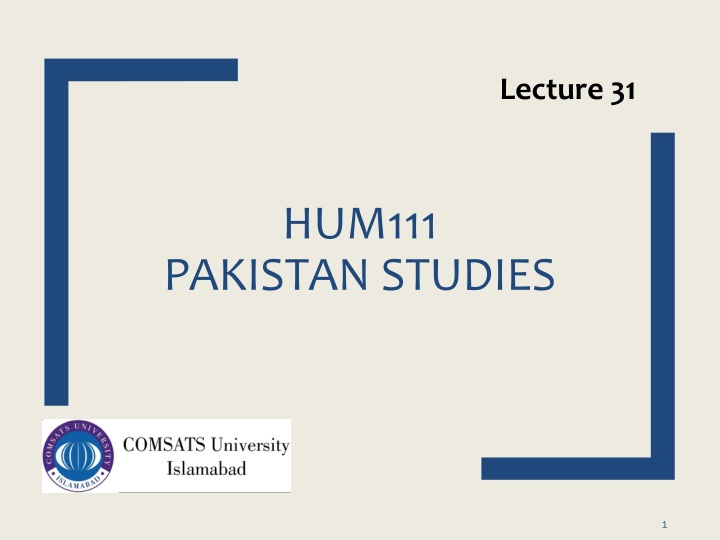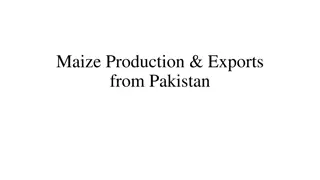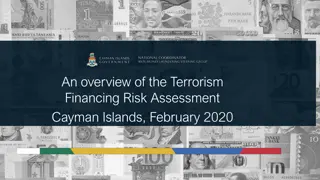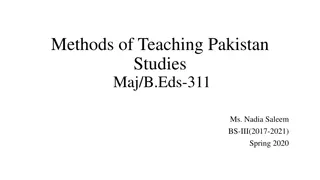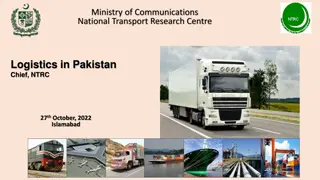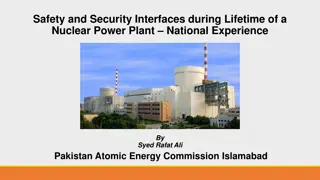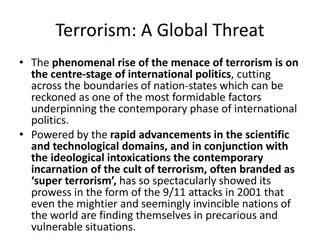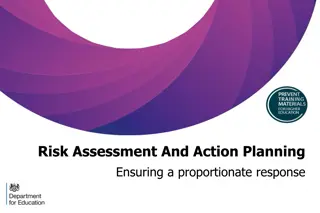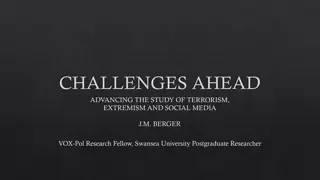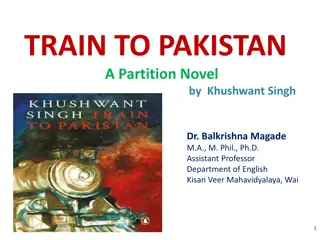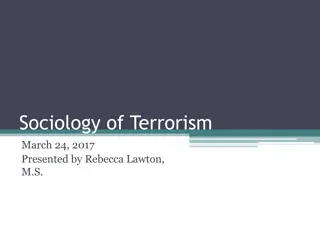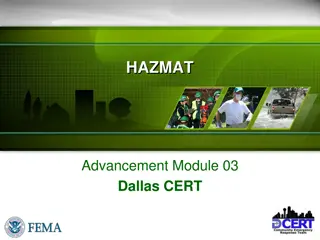Role of Pakistan in the War Against Terrorism
Pakistan played a crucial role in the War Against Terrorism by providing support in Operation Enduring Freedom, banning militant organizations, deploying troops along the Afghan border, and conducting operations against al Qaeda. This proactive engagement helped in curtailing terrorist activities in the region and enhancing global security.
Download Presentation

Please find below an Image/Link to download the presentation.
The content on the website is provided AS IS for your information and personal use only. It may not be sold, licensed, or shared on other websites without obtaining consent from the author.If you encounter any issues during the download, it is possible that the publisher has removed the file from their server.
You are allowed to download the files provided on this website for personal or commercial use, subject to the condition that they are used lawfully. All files are the property of their respective owners.
The content on the website is provided AS IS for your information and personal use only. It may not be sold, licensed, or shared on other websites without obtaining consent from the author.
E N D
Presentation Transcript
Lecture 31 HUM111 PAKISTAN STUDIES 1
HUM 111 PAKISTAN STUDIES The Role of Pakistan in the War Against The Role of Pakistan in the War Against Terrorism (C) Terrorism (C) Dr. Sohail Ahmad 2
War Against Terrorism Steps by Pakistan (Contd..) Support in Operation Enduring Freedom The air bases of Dalbandin and Jacobabad were very close to Afghanistan and proved vital when the US launched its major military operations, of which there were more than 57,000 attacks from these bases. Pakistan allowed the US military to instal radar at three of its airfields, enabling the latter to cover Pakistan s whole airspace. Additionally, Pakistan deployed more than 115,000 army and paramilitary forces along the Afghan and Iranian borders to arrest al Qaeda and Taliban militants trying to cross over. As a result of the US OEF, more than 3500 members of al Qaeda were caught trying to escape in to Pakistan. 3
War Against Terrorism Steps by Pakistan (Contd..) Banning of Militant Organizations On January 12, 2002 Pakistan banned religious militant organizations and took measures to prevent their formation under other names and collecting open donations for their activities. Lashka-e-Jhangvi, Sipah-e-Muhammad, Sipah-e- Sahaba, TJP, Tehrik-e-Nifaz-e- Shariat Muhammadi (TNSM), Jaish-e-Muhammad, and Lashkar-e-Taiba had all been banned by the government of Pakistan. 4
War Against Terrorism Steps by Pakistan (Contd..) Deployment of Army at Afghan Border Pakistan has deployed more than 120,000 soldiers along the Pak-Afghan border. Pakistan had never had experience prior to this of deploying of its troops to fight non state actors in mountainous tribal areas. It had to set up around 100 check posts to monitor the movement of militants across the border not an easy job in such inhospitable terrain with its inadequate infrastructures and the constant threat from seven major tribal agencies. 5
War Against Terrorism Steps by Pakistan (Contd..) Operations against al Qaeda and its Network Pakistan has made a very important contribution in restraining and marginalizing al Qaeda whose leaders and operatives have been arrested or killed as a direct result of strong security and administrative actions. People from Afghanistan, along with members of al Qaeda and other terrorists, were forced by the conflict to retreat to the more lawless regions of Pakistan and mixed with local tribes. This situation created problems for Pakistan s administration, and the US increased pressure on former President Parvez Musharraf to launch military operations in the tribal areas in 2002. 6
War Against Terrorism Steps by Pakistan (Contd..) Operations in the Tribal Areas As a result of the US invasion of Afghanistan, al Qaeda and the Taliban entered the lawless tribal regions of Pakistan where no regular Pakistani armed forces had yet been deployed. Afghan leaders and fighters who had fought against the Red Army returned to fight against US and Coalition forces in Afghanistan. The tribal people welcomed them according to their traditional codes of Pashtunwali life. They consolidated their existing network of facilitators and sympathisers and when Pakistan deployed its regular army to clear the region of militants and al Qaeda s members, Tehreek-e-Taliban Pakistan (TTP) emerged led by Baitullah Mehsud after Nek Muhammad was killed in action. 7
War Against Terrorism Steps by Pakistan (Contd..) TTP Retaliated From 2006 the TTP started to attract militants and rebellious groups from Federally Administered Tribal Areas (FATA) and Khyber Pakhtunkhwa to fight against the Pakistani army and installations. Thus, Pakistan had to fight against home-grown insurgents. Pakistan initiated a peace dialogue with the Baitullah Mehsud-led Tehrik-i- Taliban Pakistan (TTP) but that was set aside under pressure from the US. 8
War Against Terrorism Steps by Pakistan (Contd..) Extremism on the Rise Lal Masjid Operation Swat Taliban, Waziristan Taliban and other militants and Taliban joined hands 9
War Against Terrorism Steps by Pakistan (Contd..) Counter Militancy Efforts Pakistan made peace agreements with the Taliban but when they violated the Nizam-e-Adl Regulation 2009 in the Malakand Division, Pakistan took the strategic decision to launch military operations aimed at marginalising and eliminating terrorist outfits from tribal areas. The operations in South Waziristan were initially unsuccessful many Pakistani soldiers lost their lives in search operations or surrendered to the militants. 10
War Against Terrorism Steps by Pakistan (Contd..) Major Military Operations Al-Mizan Operation (The Balance) was conducted in South Waziristan in 2001- 02. Sherdil Operation (Lion-heart) was launched in Bajaur in 2007. Zalzala Operation (Earthquake) was conducted in South Waziristan in 2008. Rah-e-Haq Operation (The True Path) was launched in Malakand and Swat in 2008. Rah-e-Rast Operation (The Correct Path) was launched in Malakand and Swat in 2009. Rah-e-Nejaat (The Path to Salvation) was conducted in South Waziristan in 2010 11
War Against Terrorism Steps by Pakistan (Contd..) Major Military Operations Operation Zarb Azb (Name of a holy sword) was launched in NWA 2014. 12
War Against Terrorism Steps by Pakistan (Contd..) Other Military Operations A number of minor operations were also carried out against militant groups i.e. Sirat-e-Mustaqeem, Darghalam, Bia-Darghalam and Kwakhbadesham in the Khyber Agency. Rah-e-Rast and Zarb Azb were the most successful ones in restoring the writ of the government in the Malakand Division and curing Taliban in NWA. 13
War Against Terrorism Steps by Pakistan (Contd..) Agreement with Local Tribes On June 27, 2002 the Pakistani Army entered into an agreement with the local tribes of South Waziristan. It agreed that the house and property of any person found harbouring a foreigner would be destroyed 14
War Against Terrorism Steps by Pakistan (Contd..) Shakai Agreement Pakistan signed agreement with Nek Muhammad in 2004 at Shakai in Waziristan Agency. The terms of the agreement: security forces would leave the area immediately. compensation for the deaths and loss of the property suffered by the tribes. release all the innocent people it had arrested minimize its interference in tribal affairs. one month deadline to foreign elements to voluntarily surrender But Pakistan s peace efforts were sabotaged by the US missile strike from a drone that killed Nek Muhammad. 15
War Against Terrorism Steps by Pakistan (Contd..) Agreements with Ahmedzai Tribes The Government of Pakistan made two peace agreements with Ahmedzai Wazir militants and Ahmedzai tribes in South Waziristan in October and November 2004. The terms of the agreement: Economic sanctions imposed on Waziristan were lifted and all detained tribesmen released in return for the cessation of attacks on Pakistan s forces. The Ahmedzai Wazirs also agreed to cooperate in tracking down militants. The government ended the check post at Angor Adda. The situation changed when the militants resumed attacks on army camps. 16
War Against Terrorism Steps by Pakistan (Contd..) Sararogha Peace Agreement In February 2005 Pakistan reached a peace agreement with Baitullah Mehsud at Sararogha in Waziristan. This agreement came into existence after severe conflicts with tribes in Waziristan. Maulana Fazlur Rehman, leader of Jamiat Ulema-e-Islam (JUI), played his role in mediating the agreement. Due to the high number of civilian and armed forces casualties, the government was forced to bring these warring groups to a peace agreement. Baitullah Mehsud the foreign militants would live peacefully. The government offered that it would not hand over them to any other country. This agreement also failed when Baitullah s tribe broke the conditions of the agreement resulting in clashes with the army and FC. 17
War Against Terrorism Steps by Pakistan (Contd..) Miramshah Agreement In 2006, the government of Pakistan entered into an agreement with local commanders of the Taliban to withdraw troops from the region, release 165 detainees, return their weapons and abolish twelve check points. According to a Taliban statement they had also been assured by the Jirga that the government would compensate them for losses suffered during military operations. In February 2008, the government revived the same agreement with the Dawar and Wazir sub-tribes of the Utmanzai tribe, which applied to the whole of North Waziristan, Miranshah and Mirali 18
War Against Terrorism Steps by Pakistan (Contd..) Bajaur Agreement On February 23, 2009, Pakistan made an agreement with Taliban militants in the Bajaur Agency in an attempt to bring peace to this troubled area. The government promised to compensate militants and tribesmen for the loss of life and property during military operations. All government employees dismissed on suspicion of having links with the Taliban were reinstated in their roles. The Taliban also agreed to back down on their demands for the army to be pulled out of the Bajaur and agreed not to hinder troop movements in the area 19
War Against Terrorism Conclusion/Analysis 20
